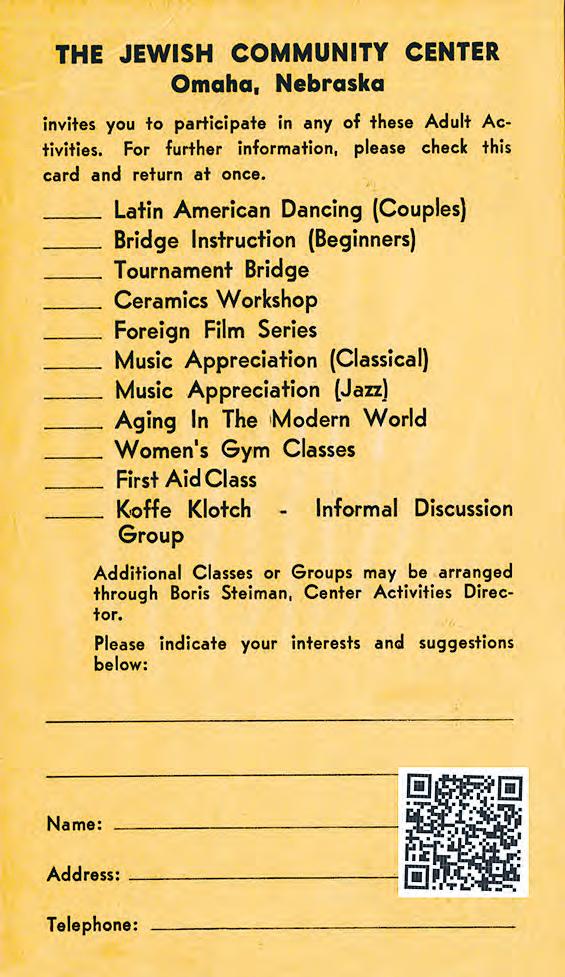








ROBERT OSBORNE
Editor’s note: This is part of Beyond Kugel: Telling the Story of Jewish Omaha through Food, a collaboration between the Nebraska Jewish Historical Society and the Jewish Press
I have the benefit of being a familial relation to this balabusta, who prefers to not accept the title but instead wants to bestow it upon her favorite grandson. Don’t be fooled! As Bubbies come, mine knows when to cook and what to cook, knows what to say and do to make sure we eat.
Susie (Sachs) Silverman has been in Omaha nearly as long as its best known and respected Jewish elders and cooks. She retains the cookbooks made by Beth El, Temple Israel, Beth Israel, and the National Council of Jewish Women through the second half of the 20th century. In these books: recipes from her mom, her dad, her sister, and some clippings from magazines and the Omaha Jewish Press
A reminder that not all dishes are excellent is a side comment made by my Bubbe: “some recipes or clippings in the books are junk.” After all, who hasn’t made a recipe that just didn’t turn out or just ended up not tasting very good?
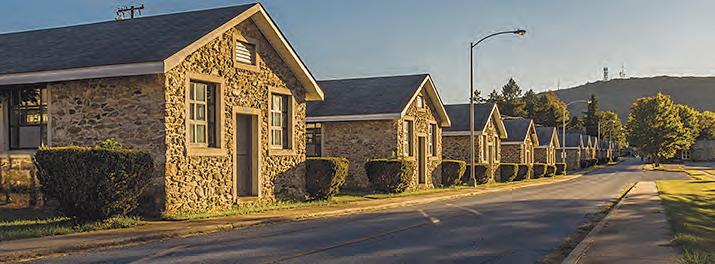
ANNETTE VAN DE KAMP-
WRIGHT Jewish Press Editor
The Institute for Holocaust Education is honored to partner with the Nebraska Jewish Historical Society to present continuing events highlighting the Ritchie Boys. Over the past months, our community has had the opportunity to see the Ritchie Boys documentary in our Alan J. Levine
Performing Arts Theater. The Nebraska Jewish Historical Society simultaneously curated a display of items belonging to Warner B. Frohman, father of Margo Parsow and a former Ritchie Boy. The exhibit is accessible to the public in our Milton Mendel and Marsha Kleinberg Omaha Jewish Heritage Center.
Now, on Monday, Feb. 3, Ritchie History Museum Director Katy Self will speak in the Goldstein Venue at the Staenberg Omaha JCC. The event starts at 7 p.m.; admission is free and RSVPs are not required.
The Ritchie History Museum, located in Cascade, Maryland, is dedicated to preserving, exhibiting and interpreting the powerful stories of the fort’s history and its contribution to Maryland and American Military See The Richie Boys page 2
These books are the golden rule for my family. Everyone knows the recipes and everyone enjoys them, but not everyone understands where they originated. Losing these would be akin to erasing the history and joys held at each seder, holiday dinner, feast, shabbat, casual get-togethers, and all the staple family meals of the day. It’d be a real shame to not pass down these recipes within the family to at least one person who can cook, even if only half as good as Bubbe. It would be a shame if these recipes weren’t shared with the community, because someone out there just might want to try something new or mingle their ideas with one of those listed here.
These are only the recipes of one family, but it is the hopes that many more families will share the recipes from their Bubbies and family’s Balabustas and Balabosses with The Omaha Jewish Press. By sharing these recipes, we hope to continue the tradition of good food from generation to generation. We all must eat and eating well is the best.
Before you think that sharing the following recipes is akin to sacrilege... Nobody makes it better than my Bubbe! See The Balabusta page 3

AMY
BERNSTEIN SHIVVERS
JFO Foundation Executive Director
As we turn the page to a new year, it’s the perfect time to reflect on the highlights and achievements that made 2024 truly remarkable. Taking stock of the “best of 2024” not only celebrates our successes but also provides inspiration and momentum for what lies ahead.

1. Strengthening Community Bonds This year was marked by the incredible power of community, both near and far. From the amazing
attendance and generosity during our Life & Legacy 10th Anniversary celebration with Ari Axelrod to the warmth of our Omaha Jewish Alumni Minneapolis Reunion hosted at Jenny Javitch and Alon Ventura’s home, 2024 was a true testament to #Home townPride.
2. Amplifying Impact An unprecedented surge in philanthropy defined this year, with $1.3 million raised in just three months through innovative initiatives like The Foundation’s 4Q Endowment Incentive Match. See Reflecting on 2024 page 4
SCOTT LITTKY
On Thursday, Feb. 20 at 11:30 a.m. on Zoom, Dr. Beth Dotan will be our presenter. Beth Dotan, Research Assistant Professor, joined the Harris Center for Judaic Studies in 2023. Her doctoral and present research focuses on digital Holocaust memory and education and considers how critical inquiry, and methodologies can be effective in the continued relevance of Holocaust studies.
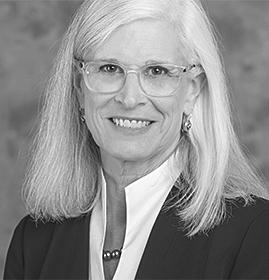
Dr. Dotan was formerly the Director of the International Department at the Ghetto Fighters’ House Holocaust and Jewish Resistance Heritage Museum in the Western Galilee, Israel, and was the Founding Executive Director of the Institute for Holocaust Education (IHE) in Omaha, Nebraska, serving for 13 years.
Dr. Dotan will be providing us with an update of the Nebraska Stories of Humanity: Holocaust Survivors & WWII Veterans, Net-
work Portal & Educational Website. The Nebraska Stories of Humanity: Holocaust Survivors & WWII Veterans, Network Portal & Educational Website aims to centralize access to the history of Nebraska Holocaust survivors and WWII liberators of Nazi camps in a collection of searchable stories in aggregate. The site includes testimony, geographical and primary historical resources, documentation, and photos collected or harvested from local and disparate sources. Various tools enhance these stories through technologies such as digital story maps, access to testimonies, and network analysis of these individuals who were connected to and involved in their Nebraska communities. The project engages individual contributors, local stakeholder organizations, and national and international repositories.
For more information or to register for the IHE Third Thursday Lunch & Learn, please email Scott Littky, IHE executive director at slittky@ihene.org
The award-winning B’NAI B’RITH BREADBREAKERS speaker program currently meets Wednesdays via Zoom from noon to 1 p.m. Please watch our email for specific information concerning its thought-provoking, informative list of speakers. To be placed on the email list, contact Breadbreakers chair at gary.javitch@gmail.com
FRIEDEL JEWISH ACADEMY • ISRAEL • JCC DAY CAMP
• JEWISH PRESCHOOL • JEWISH SUMMER CAMP • POSTSECONDARY EDUCATIONYMEDACA• HSIWEJ LEDEIRF
• ISRAEL • JCC DAY CAMP • JEWISH PRESCHOOL • JEWISH SUMMER CAMP • POST-SECONDARY EDUCATION
• FRIEDEL JEWISH ACADEMY • ISRAEL • JCC DAY CAMP
• JEWISH PRESCHOOL • JEWISH SUMMER CAMP • POSTSECONDARY EDUCATION • YMEDACA HSIWEJ LEDEIRF
• ISRAEL • JCC DAY CAMP • JEWISH PRESCHOOL • JEWISH SUMMER CAMP • POST-SECONDARY EDUCATION
• FRIEDEL JEWISH ACADEMY • ISRAEL • JCC DAY CAMP
• JEWISH PRESCHOOL • JEWISH SUMMER CAMP • POSTSECONDARY EDUCATION • FRIEDEL JEWISH ACADEMY • ISRAEL • JCC DAY CAMP • JEWISH PRESCHOOL • JEWISH SUMMER CAMP • POST-SECONDARY EDUCATION •
Continued from page 1 History. The Museum aims to honor veterans and their families from Fort Ritchie’s past by retelling their stories of dedication and sacrifice. Through retelling the stories in a way that reflects the honor and integrity the soldiers served with, the museum staff also create educational opportunities.
Director Katy Self is a graduate of the University of South Carolina in Columbia, SC, where she received her bachelor’s degree in anthropology, focusing on archaeology. She received her Master of Arts in Museum Studies with a Post-baccalaureate Certificate in Digital Curation from the Johns Hopkins Advanced Academic Program. Her research has focused on the evaluation of exhibitions and the digitization processes and management of small museums.
symposium for the Ritchie Boys and gathered many materials to help spread the story.
In 2004, a new documentary was released, but for many years the story of the Ritchie Boys remained a quiet secret. However,

when Fort Ritchie was sold in 2021, its new owner determined historic preservation was necessary. He set aside two large buildings for the purpose of a museum and research center. Within a month, 60 Minutes produced a program about the Ritchie Boys, which was seen by millions.
& SCHOLARSHIPS ARE AVAILABLE TO HELP PAY FOR THESE GREAT JEWISH EXPERIENCES! Scholarship funding also available for post-secondary education, including vocational training and college.
Applications due March 3, 2025
For more info and applications, scan the QR code, visit www.jewishomaha.org, call (402) 334-6551, or email Diane Walker at dwalker@jewishomaha.org

Many years ago, Fort Ritchie had a small museum on its post. In the 1970s, Post Commander Detrich’s wife, Becky, wanted to collect as much history about Ritchie as she could. For years, she shared the history with local groups. If it had not been for her hard work, much of that history would have been lost.
In 1998, Fort Ritchie officially closed, and many items from the small museum were sent to different locations around the U.S. Many of those materials are still missing. Dr. Guy Stern, Director of the Holocaust Memorial Center in Farmington Hills, Michigan and a Ritchie Boy himself, was able to organize a
Please join us to hear the story directly from the museum’s current Director, because it is a story worth hearing.
Finally, on Sunday March 2, 2025, Aaron Parsow, son of Margo and Jay Parsow, z”l, will speak about his grandfather, Warner B. Frohman. We welcome you at 2 p.m. in Temple Israel’s Social Hall; more information about Aaron’s speech is coming soon. For questions about where to see The Ritchie Boys film online, or additional information about these programs, please reach out to Scott Littky at slittky@jewishom aha.org or Jane Rips at jrips@jewish omaha.org
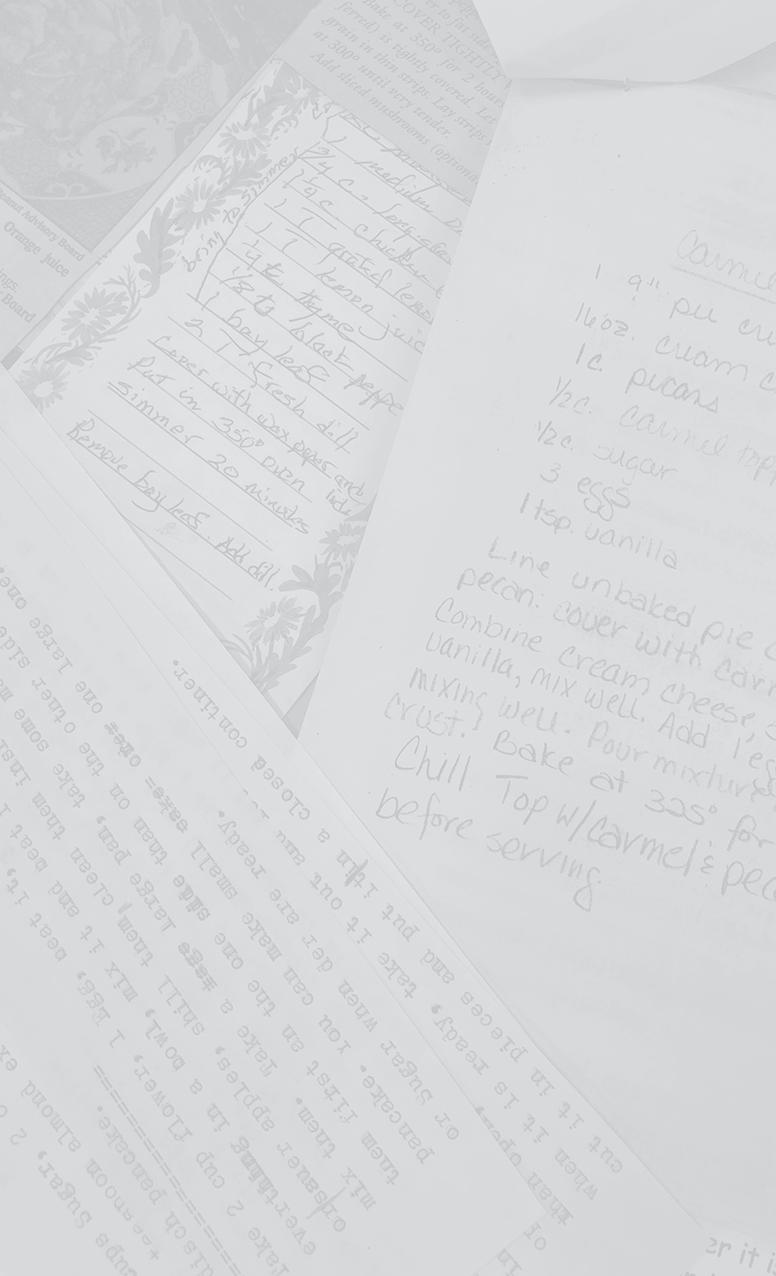
We are looking for your handwritten family recipes. Please contact Jane or Annette if you are willing to share: jrips@jewishomaha.org avandekamp@jewishomaha.org
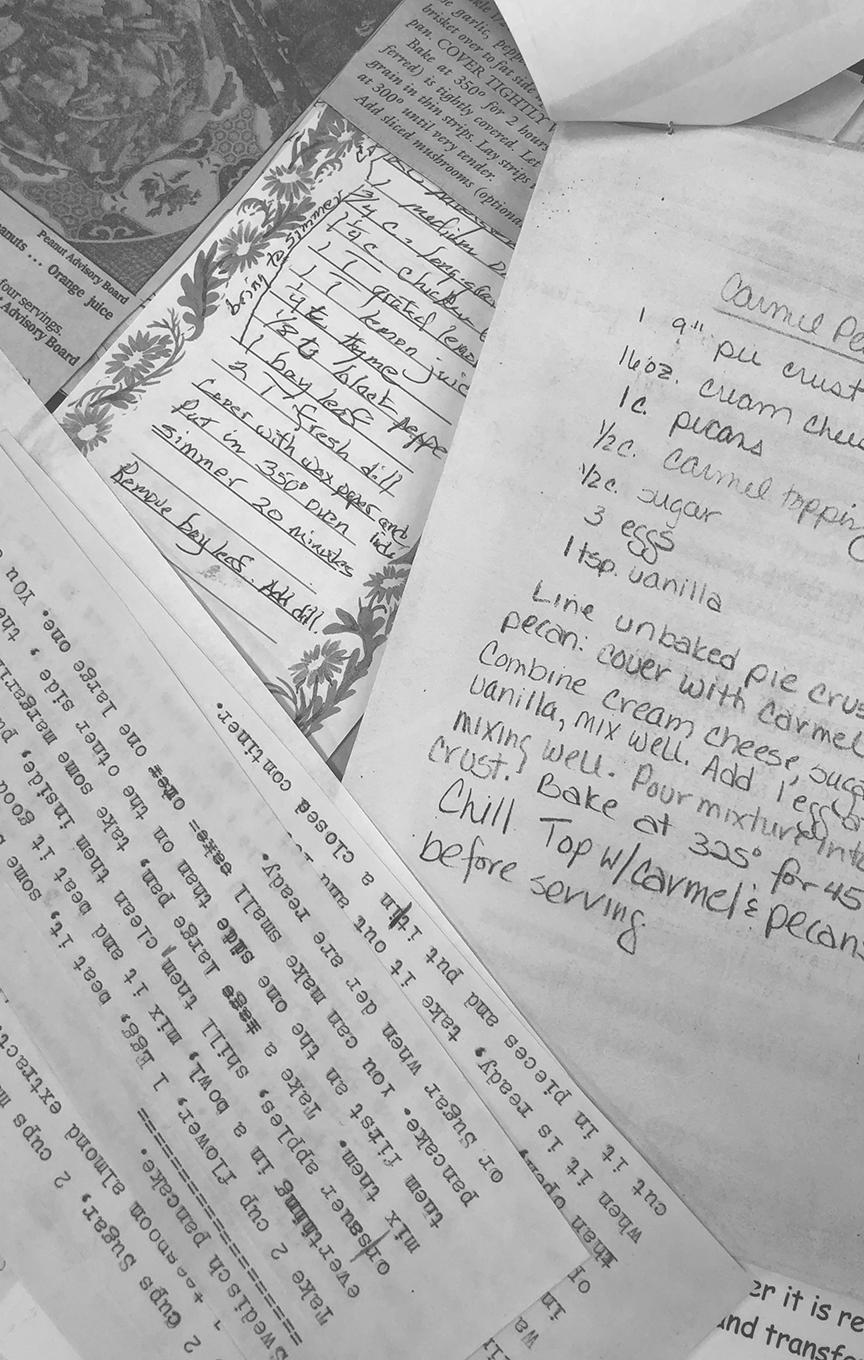

ANNIE RIFKIN, MSW, PLMHP
JFS Therapist and Program Specialist
Film & Friends is a program for adults, offering an opportunity to connect, share stories, and enjoy films in a welcoming environment. Film & Friends is being brought to you by Jewish Family Service in partnership with the Jewish Federation of Omaha and the Staenberg Omaha JCC. We are excited to be bringing back movie showings at the theater. Previously this event was hosted by the “MAINStreeters” committee starting as early as 2010. This program isn’t just about watching films—it’s about building friendships and meaningful experiences. The community is encouraged to grab a bite at the Star Deli, then come enjoy a film at the Alan J. Levine Performing Arts Theater. Concessions will be available for purchase outside the theater. Screenings include time to interact before and after the movie, fostering conversations and connections. This program is made possible by a grant from the Milton S. & Corinne N. Livingston Fund.
UPCOMING SHOWINGS AND SAVE THE DATES:
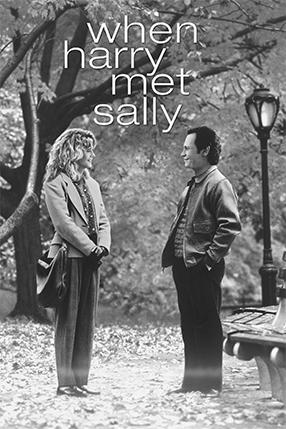

Movies are shown once a month on Friday afternoons beginning at 1p.m.: Feb. 7: When Harry Met Sally, March 21: Field of Dreams, April 11: (film TBD) and May 30: (film TBD). Join Us!
For details, questions, or movie suggestions, contact Annie Rifkin: arifkin@jfsom aha.com
MORGAN GRONINGER
JCRC Program and Communications Manager
The Omaha Jewish Community Relations Council invites members of the Jewish community to join us and students from Friedel Jewish Academy for the third annual Jewish Day of Action at the Nebraska Capitol on Feb. 4, 2025. The day will start at 8:30 a.m. with opportunities to meet with senators and their staff. Use your voice to represent the Jewish community as we share concerns and support on issues that impact our community and vulnerable and marginalized people in our state for years to come. A kosher luncheon will follow at noon at the Hruska Law Center. Please RSVP by Jan. 31, 2025, to Pam Monsky, JCRC
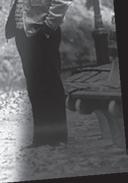
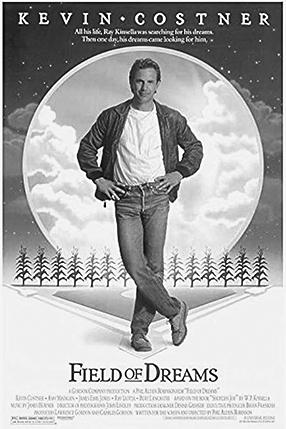

Assistant Director, at pmonsky@jewishomaha.org
Several online tools are available to help community members stay informed about legislative developments. Scan the QR codes with your phone to access the legislative calendar,

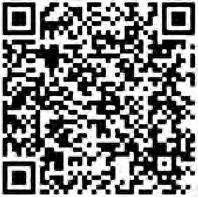
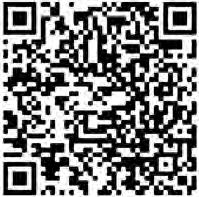
bill search, and get your senator’s contact information.
Continued from page 1
For the appetizer tonight is an uncommonly made but very much enjoyed recipe Bubbe’s Pop Overs for Passover.
BUBBE’S POPOVERS FOR PASSOVER
Bring to a boil.
1/2
Beat together... Cool. Add 8 eggs beating well after each. Grease muffin tins. Bake at 450 degrees for 15 min. or 350 degrees for 25 min.
Although my Bubbe makes a mean kugel, she doesn’t get congratulated enough for this simple popover recipe. It’s like little muffins but they’re airy and you can eat a whole tray with little regret. Now, if you’re looking for a secondary appetizer that you can put on crackers, here’s a good and super simple egg salad.
BUBBE SILVERMAN’S EGG SALAD
Boil Eggs (around 5 or 6). Cover them in water in a pot on high. When it starts to boil, for around 5 minutes, then turn it to low for about 15 minutes. This keeps the eggs from cracking. Then, run the eggs under cold water and let sit for a few minutes until you can handle them. Peel the shells off all the eggs and then smash your eggs in a large enough bowl. Add cut-small celery; mayo; a bit of yellow mustard. Add salt and pepper for taste. Ask someone near to you to taste while you make this. Refrigerate or serve straight.
A very famed family recipe for Break the Fast is Mom’s (Libby Sachs’) Kugel. If you substitute matzoh for noodles, it can also be used for Passover.

Susie Silverman
1/4 lb. grated sharp cheddar cheese
1 cup sour cream
1 stick melted butter
1/2 cup sugar raisins
Mix all of the above and pour into a 9 x 12 Pyrex pan. 2nd Mixture
Mix together.
4 eggs 1/2 cup sugar
1 3/4 cup milk
1 tsp. vanilla
Pour above mixture over the noodle mixture. Bake at 350 degrees for 1 hour and 15 minutes. Cool. Cut.
This can be frozen for up to a month.
In my Bubbe’s recipe book, in her mother’s handwriting, she has each night’s meal plan for Passovers in the 60s which reveals the gefilte fish recipe of 9 1/2 lbs of buffalo and carp at $0.70/lb. She, Libby (Abramson) Sachs, also made her own horseradish and everything else from scratch. My great-grandmother was also a balabusta.
For dessert is Pink Champagne Dessert from my Bubbe’s late sister Ilene (Sachs) Klein.
Mix together
8 oz. Philadelphia Cream Cheese 3/4 cup sugar
Add
1 large can well drained, crushed pineapple
8 oz. frozen strawberries (thawed)
2 bananas sliced Pecans or walnuts – chopped
Last, add 12 oz. Cool Whip
Pour into pan and cover and freeze.
I hope you will enjoy these recipes as much as my family does.




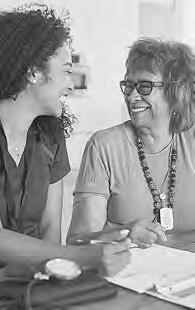

Continued from page 1
These efforts brought 23 new endowments to life, benefiting organizations including the Jewish Community Relations Council, Congregation B’nai Jeshurun/South Street Temple, Rose Blumkin Jewish Home, Jewish Federation of Omaha, Jewish Federation of Lincoln, Jewish Business Leaders, Beth Israel, Jewish Family Service, Chabad, and Tifereth Israel Synagogue.
introduced the Kaiman Family Camp Grant, offering financial support to ALL Jewish children attending a Jewish overnight or day camp at the JCC. Howard’s fondest childhood memories were of his time at overnight camp, and this initiative ensures that others can create similarly meaningful experiences.
The Kaiman Family Camp Grant will provide close to $100,000 in 2025.


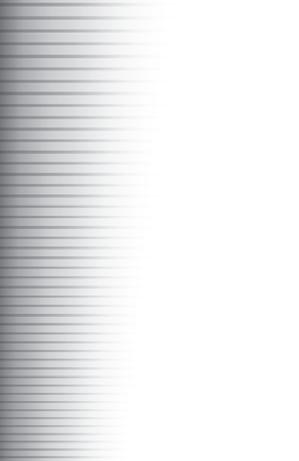



The annual income earned from investments of these endowments will support the Annual Campaign, combat antiSemitism, provide college scholarships, maintain cemeteries and buildings, create enriching youth and senior programs, and ensure a secure future for our community. ThankYou!
3. Grants and Scholarships Impact Increase In 2024, The Foundation achieved a historic milestone by distributing nearly $1.4 million in grants and over $570,000 in scholarships. This record-breaking total was made possible through the dedicated efforts of our granting organizations (Anything Grants, THE CHESED FUND, Albert & Eleanor Feldman Family Israel Foundation, Foundation Grants, Herbert Goldsten Fund, Shirley & Leonard Goldstein Supporting Foundation, Milton S. & Corinne N. Livingston Foundation Fund, Phillip & Terri Schrager Supporting Foundation, Lazier L. & Harriet B. Singer Memorial Fund for Youth, and the Special Donor-Advised Fund) and the Financial Aid Committee, responsible for awarding need-based scholarships and the Phil & Ruth Sokolof Honor Roll Fund Committee.

6. Building Partnerships Welcoming Congregation B’nai Jeshurun/South Street Temple into our Life & Legacy program was a highlight of 2024. Under the leadership of Sarah Kelen, the Lincoln Jewish Community—small but mighty—is helping to expand our partnerships, deepen our Jewish network, and enhance the work of our foundation.
As part of our Life & Legacy 10th Anniversary goal, we are well on track to secure 10 new Letters of Intent, demonstrating the power of #Collaboration.

These funds have had a profound impact on our community, supporting essential programs, providing life-changing educational opportunities, and reinforcing our commitment to building a stronger, more vibrant Jewish future.
4. Empowering the Next Generation New initiatives like the Young Professional Tzedek Program (YPTP) inspire young adults to embrace charitable giving. Our Pay It Forward Endowment Fund, designed to engage young families and college graduates, allows donors to express gratitude while supporting scholarships for children, teens, and college students for as little as $18.
7. Showing Gratitude We are incredibly grateful to Alley Poyner Macchietto Architecture, the award-winning firm behind iconic projects like the Joslyn Art Museum, Millworks Commons, and the Farnam Hotel, for collaborating pro bono on our office refresh.
Over the past six months, Nancy Novak and Nicci Champoux provided invaluable guidance, expertise, and support. Without their professionalism and commitment to detail, this project could not have been realized.
Key to the remodel were our agency friends at Jewish Family Service, Jewish Community Relations Council, Institute of Holocaust Education, and Nebraska Jewish Historical Society. These organizations graciously opened their doors to The Foundation team, offering workspace and hospitality. This collaboration provided a unique opportunity to connect with and appreciate the incredible work happening across our campus.

Our newest team member, Brad Abramson, has expressed enthusiasm for the Pay It Forward program. As a father of a young family, Brad recognizes the importance of giving Jewishly and is excited to help others do the same.
5. Honoring Legacy We celebrated the enduring impact of leaders like Howard Kaiman, of blessed memory, whose vision and generosity continue to inspire us. This Hanukkah, we
Behind the scenes, Jason Epsenhart and Phil Malcom provided invaluable guidance and support, working seamlessly with Ronco Construction to bring the vision to life.
8. Celebrating Dedication Let’s raise a glass in appreciation for Laurie Peatrowsky, our operations manager, who celebrated an incredible 25 years with The Foundation this past December! Laurie’s dedication, passion, and expertise have been instrumental in shaping our success, and we are so fortunate to have her as part of our team. #GoLaurie! As we welcome 2025, let us carry forward the lessons, triumphs, and spirit of collaboration that defined 2024. Together, we can build on this foundation to make the year ahead even more meaningful.
Wishing you a happy and impactful 2025!
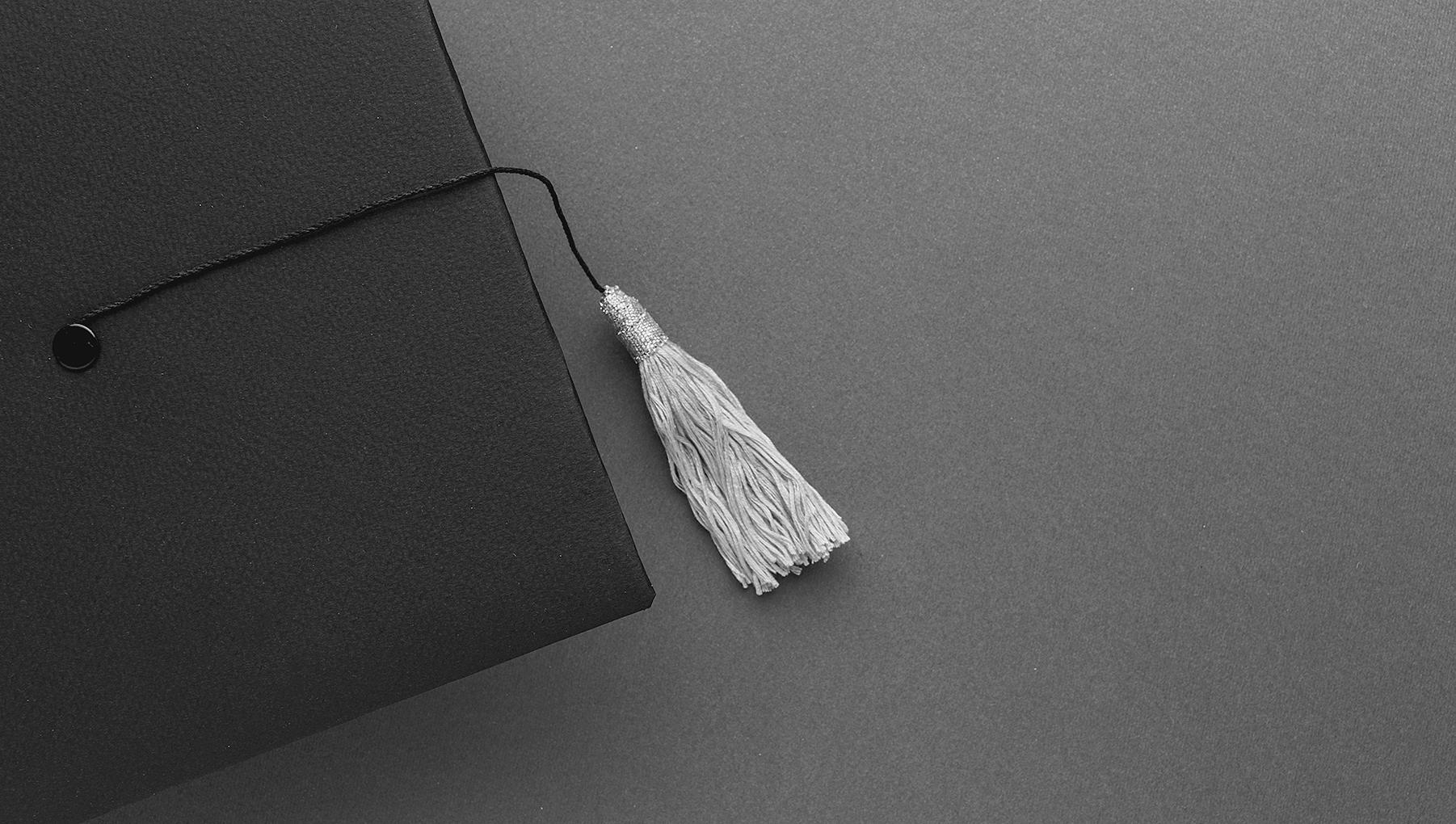
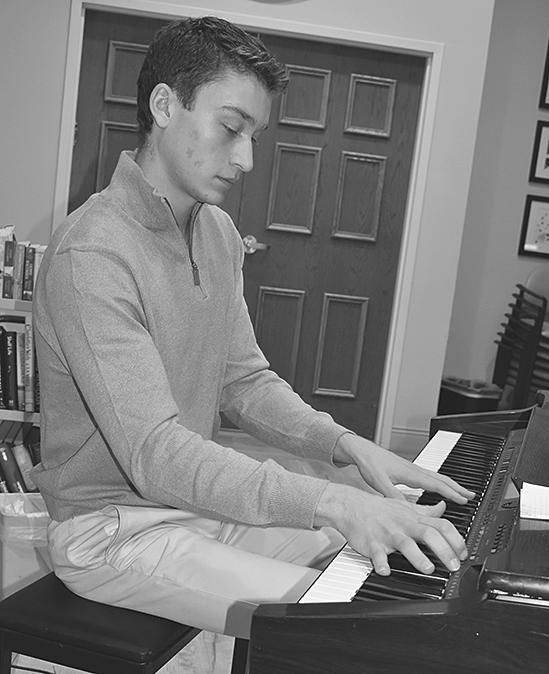
and dynamics.
‘Write With Us,’ the recent collaboration between the Nebraska Jewish Historical Society and the Jewish Press, will continue in smaller format in the Fall. New workshops are scheduled for Feb. 13, March 20 and April 17 from 6-8 p.m. in the Noshery at the Staenberg Omaha JCC. Register by contacting Jessi at jtaylor@jewishomaha.org or Annette at avandekamp@jewishomaha.org. There is no cost to attend, although donations are always welcome. If you have wanted to write your family’s story, that great American novel, or you have always wanted to try your hand at poetry, join us! Maybe you are already an accomplished writer, but you would benefit from being in a room with other writers. Perhaps you have convinced yourself you can’t write at all, but would love to try. Everyone, from absolute beginner to professional, is welcome to attend.

JTA
Rep. Elise Stefanik decried “antisemitic rot” at the United Nations and called for the international body’s Palestinian aid agency to be defunded at her Senate confirmation hearing to become the U.S. ambassador to the U.N. She also defended a campaign ad that was criticized for promoting the antisemitic “great replacement” theory. And she rejected allegations that Elon Musk had performed a Nazi salute at a rally following President Donald Trump’s inauguration.
Questions about Israel — and accusations that the U.N. is biased against it — were a central theme of the confirmation hearing. Stefanik, a close Trump ally and Republican congresswoman from upstate New York, is a member of congressional leadership and attracted international attention in December 2023 for asking three elite university leaders’ about whether their schools prohibit calls for genocide against Jews. Video of the leaders’ answers sparked widespread outrage, leading two of them to step down.
Stefanik mentioned the hearing in her opening statement.
“On the [House] Education Committee, I have been the leader in combating antisemitism in higher education,” she said. “This hearing with university presidents was heard around the world and viewed billions of times because it exposed the antisemitic rot in colleges and universities and was a watershed moment in American higher education.”
She later said a similar “rot” existed at the United Nations. Israel and its defenders, including the United States, have long accused the U.N. of disproportionately criticizing Israel.
“If you look at the antisemitic rot within the United Nations, there are more resolutions targeting Israel than any other country, any other crisis combined,” she said, noting that a U.N.-affiliated women’s organization did not condemn sexual violence that took place during Hamas’ Oct. 7, 2023, attack on Israel. “We need to be a voice of moral clarity on the U.N. Security Council and at the United Nations at large for the world
Announcements may be e-mailed to the Press at jpress @jewishomaha.org; or mailed to 333 So. 132 St., Omaha, NE 68154. Readers can also submit announcements -- births, b’nai mitzvahs, engagements, marriages, commitment ceremonies or obituaries -- online at www.omahajewishpress. com/site/forms/. Deadlines are normally nine days prior to publication, on Wednesdays, 9 a.m. Please check the Jewish Press, for notices of early deadlines.
to hear the importance of standing with Israel.”
Stefanik’s statements could position her to be a successor of sorts to Nikki Haley, who served as U.N. ambassador at the beginning of Trump’s first term in office and gained fans among pro-Israel activists for her outspoken defense of Israel. Stefanik also recalled her past vote to defund UNRWA, a U.N. Palestinian aid agency that provides social services across Gaza and the West Bank, and that Israel has accused of having ties to Hamas. Democratic senators noted areas of agreement with Stefanik but also challenged her at times on accusations of antisemitism in her own party and ideological camp. Sen. Tim Kaine raised a past Stefanik campaign ad that said Democrats want to “overthrow our current electorate” by permitting undocumented immigrants to come into the country. Critics said the ad echoed the “great replacement” theory, a rightwing conspiracy theory alleging that Jews are using mass immigration to orchestrate the replacement of Western nations’ white populations.
Kaine did not ask a question about the ad, saying he “can separate campaign rhetoric from government rhetoric.” But Stefanik defended it, saying, “I stand strongly for border security and that was what the tweet you referenced was related to.” She and Kaine sparred about whether Democratic senators supported open borders, but she did not refer to the charge of promoting antisemitism. In response to another question, she declined to say directly whether Palestinians deserve self-determination, though she said, “Of course they deserve human rights.” She also confirmed that she believes Israel has a biblical right to the entire West Bank.
The Old Avoca Schoolhouse in Avoca, Nebraska will be streaming three online Irish Fiddle Tunes for Two Workshops for violins, violas, cellos, basses, mandolins, soprano recorder, and alto recorder.
The workshop will explore tunes from our Irish Fiddle Tunes for Two book. This collection features 32 reels, hornpipes, polkas, jigs, and waltzes, arranged for two instruments, with chord symbols for guitar accompaniment.
The Workshops will be on Tuesday, Feb. 11, 7 p.m., Central Time, Wednesday, Feb. 12, 10 a.m., Central Time, and Friday, Feb. 14, 7 p.m., Central Time
For more information, and to register for the workshop: https://greenblattandseay.com/workshops_irish.shtml






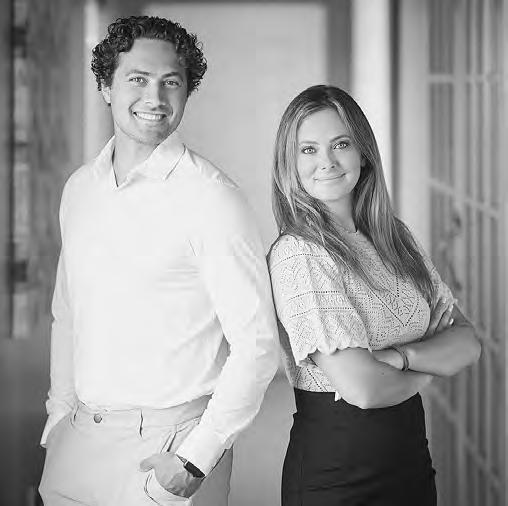

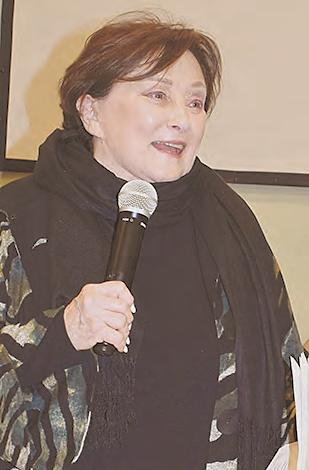

Above left: A shout-out to Current Events Volunteer Nancy Rips, who has been coming twice a month to the Rose Blumkin Jewish Home for years. She has been a dedicated volunteer and friend to RBJH since the 1970s. A half-century of service speaks volumes about her dedication, and on behalf of all the Residents she has touched through her service, we express our heartfelt thanks! Above right: Friedel’s Jewish Academy’s annual bounce house party for FJA students and their families.
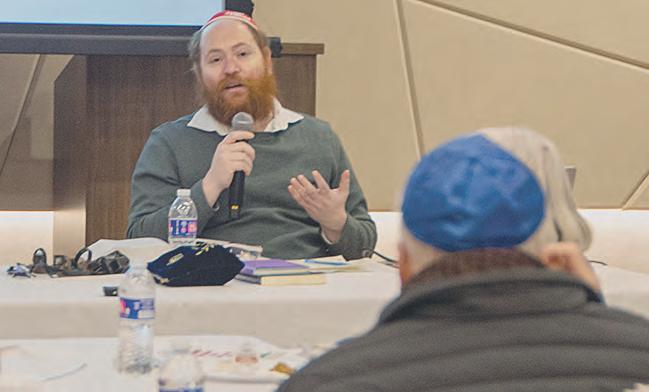


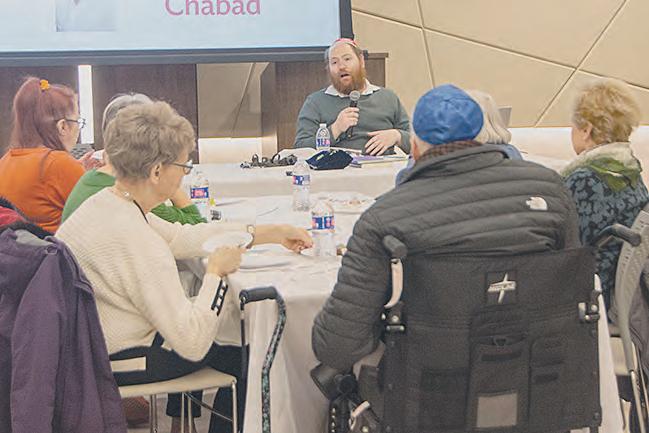
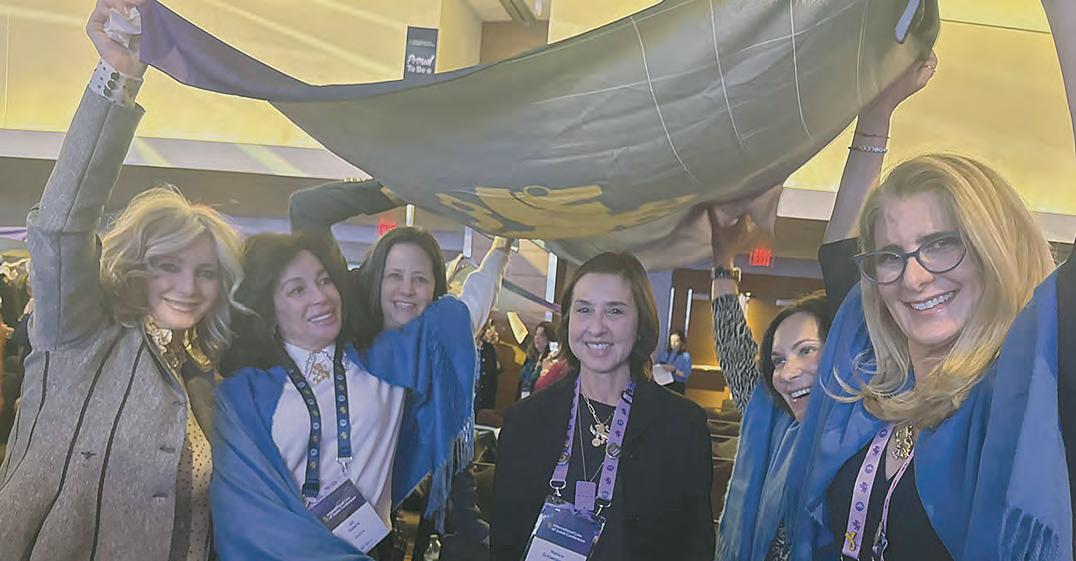

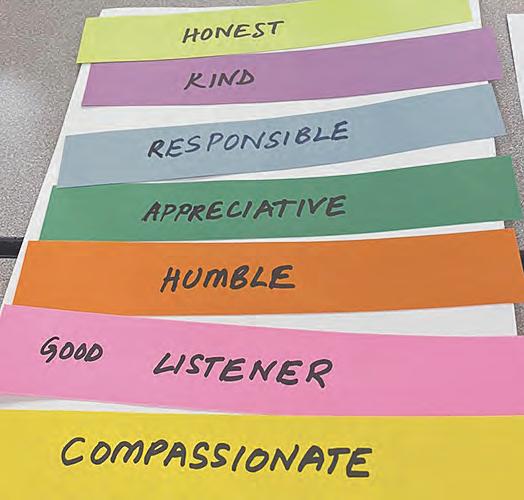
behaving appropriately. Each table at the morning meeting had the same cards with various behaviors and attributes, and they arranged them in order of importance.
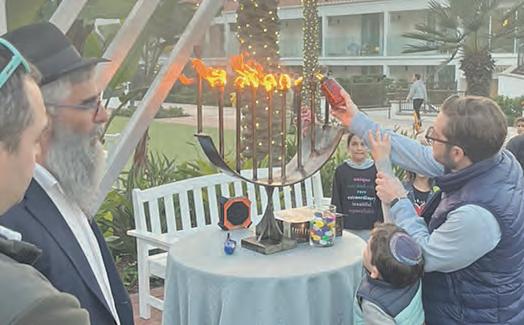

PHOTOS FROM RECENT JEWISH COMMUNITY EVENTS
SUBMIT A PHOTO: Have a photo of a recent Jewish Community event you would like to submit? Email the image and a suggested caption to: avandekamp@jewishomaha.org
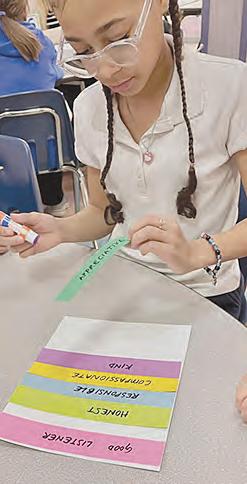
GENEROUSLY SUPPORTED BY
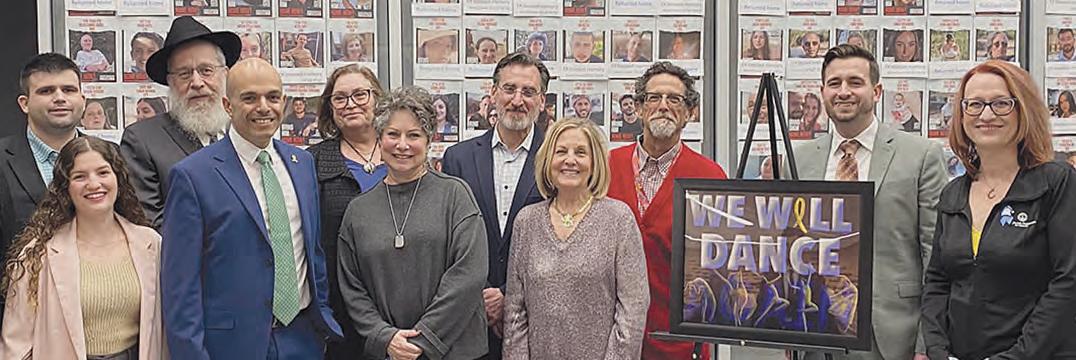

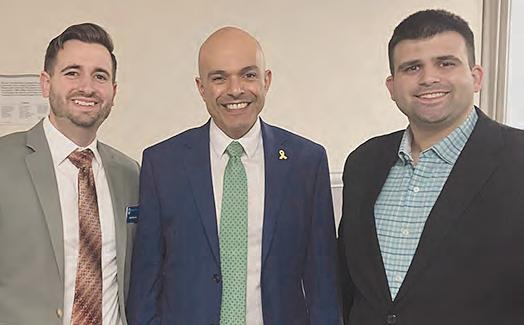
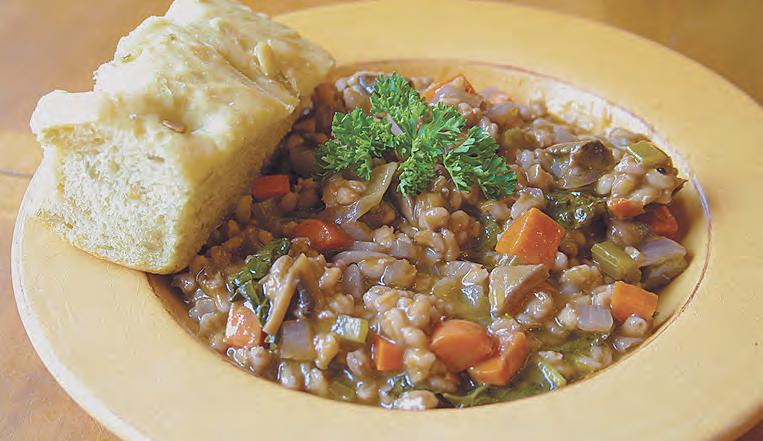
Linda Mann
Ingredients:
3/4 cup barley
2 quarts chicken stock
2 celery stalks, diced
1 onion, chopped
2 carrots, sliced
1/2 lb. mushrooms, sliced parsley salt and pepper, to taste

Barbara Frankel
Ingredients:
4 onions, diced
3 quarts water
2 lbs. chuck, cubed
1 can tomato paste
1 Tbsp. paprika caraway seeds, to taste
1 Tbsp. marjoram salt and pepper, to taste
Directions:
Preheat the oven 325 degrees. Pour all ingredients in a soup pot and bake in the oven for 2 to 3 hours. Thicken, if necessary. Potato starch works well. Wonderful on a cold winter day with salad and hot bread.
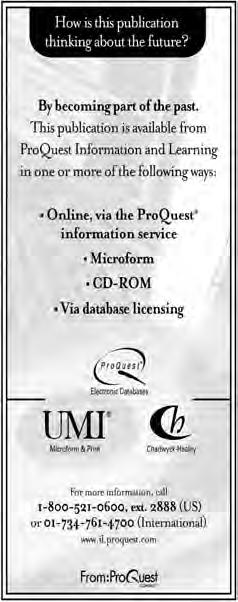
Directions:
Wash barley. In a large pot, combine barley, stock, celery and onion. Bring to a boil. Reduce heat, cover and simmer for 1 to 1 1/2 hours. Add carrots, mushrooms, salt and pepper. Cook for an additional 15 to 30 minutes. Add parsley before serving. Can also be made with beef bones and stew meat. Bring water to boil then add bones and meat. Cook. Skim fat and then continue as above omitting the chicken stock.

Marcia Cohen
Ingredients:
2 large cans cherry pie filling
1 large can pears, drained
1 large can bing cherries, drained
1 large can fruit cocktail, drained
1 large can pineapple chunks, drained
1 large can peaches, sliced and drained
1 tsp. cinnamon 1/2 tsp. nutmeg
16 oz. package marshmallows 1/4 cup brown sugar
Directions: Preheat the oven to 350 degrees. Spray casserole with Pam. Combine ingredients. Cover with marshmallows. Bake uncovered for 45 minutes.
Debbi Josephson
Ingredients:
1 can tomato soup
3 oz. cream cheese
2 envelopes of gelatin
1/2 cup cold water
1 cup celery, diced
1 green pepper, diced
1 onion, grated
1 lb. can of salmon
1 cup mayonnaise
1 Tbsp. Worcestershire sauce
1/8 tsp. pepper
1/2 tsp. salt
Directions:
Heat soup in a double boiler or microwave. Add cream cheese and stir until melted. Soften gelatin in water. Add soup mixture. Stir until dissolved. Add the rest of the ingredients. Pour into a 6 cup mold. Serves 8.
Marti Rosen-Atherton
Ingredients:
1 1/2-2 lbs. stew meat
2-3 onions, sliced salt and pepper, to taste
3/4 cup water
1 large can sauerkraut
2 Tbsp. sugar
1 cup sour cream
Directions:
Brown onions and meat (can be done in a dry frying pan). Season to taste. Add water and simmer for 2 hours. Add sauerkraut and sugar. Simmer 1/2 hour. Before serving, add sour cream. Serve over noodles.
Joyce Cohen
Ingredients:
8 cups chicken soup, homemade preferred
3 carrots, sliced
2 celery stalks, sliced
1 onion, chopped
1 can stewed tomatoes
1 can garbanzo beans
1 package frozen leaf spinach
1 cup cooked chicken, cubed
2 cloves garlic
1 Tbsp. Italian seasoning or fresh basil and oregano
Directions:
Put all ingredients in a pot. Bring to a boil. Simmer for 20 minutes. Add cooked pasta or rice before serving. Other vegetables to add: grilled or roasted veggies of any sort. Mushrooms, Italian cut green beans, zucchini, summer squash, red pepper strips or artichokes. Empty your vegetable drawer and use leftovers.




(Founded in 1920)
David Finkelstein
President
Annette van de Kamp-Wright
Editor
Richard Busse
Creative Director
Claire Endelman
Sales Director
Lori Kooper-Schwarz
Assistant Editor
Sam Kricsfeld
Digital support
Mary Bachteler
Accounting
Jewish Press Board
David Finkelstein, President; Margie Gutnik, Ex-Officio; Helen Epstein, Andrea Erlich, Ally Freeman, Dana Gonzales, Mary Sue Grossman, Hailey Krueger, Chuck Lucoff, Larry Ring, Melissa Schrago, Suzy Sheldon and Stewart Winograd.
The mission of the Jewish Federation of Omaha is to build and sustain a strong and vibrant Omaha Jewish Community and to support Jews in Israel and around the world. Agencies of the JFO are: Institute for Holocaust Education, Jewish Community Relations Council, Jewish Community Center, Jewish Social Services, Nebraska Jewish Historical Society and the Jewish Press Guidelines and highlights of the Jewish Press, including front page stories and announcements, can be found online at: www.jewishomaha.org; click on ‘Jewish Press.’ Editorials express the view of the writer and are not necessarily representative of the views of the Jewish Press Board of Directors, the Jewish Federation of Omaha Board of Directors, or the Omaha Jewish community as a whole. The Jewish Press reserves the right to edit signed letters and articles for space and content. The Jewish Press is not responsible for the Kashrut of any product or establishment.
Editorial
The Jewish Press is an agency of the Jewish Federation of Omaha. Deadline for copy, ads and photos is: Thursday, 9 a.m., eight days prior to publication. E-mail editorial material and photos to: avandekamp@jewishomaha.org ; send ads (in TIF or PDF format) to: rbusse@jewishomaha.org
Letters to the Editor Guidelines
The Jewish Press welcomes Letters to the Editor. They may be sent via regular mail to: The Jewish Press, 333 So. 132 St., Omaha, NE 68154; via fax: 1.402.334.5422 or via e-mail to the Editor at: avandekamp@jewishomaha.org.
Letters should be no longer than 250 words and must be single-spaced typed, not hand-written. Published letters should be confined to opinions and comments on articles or events. News items should not be submitted and printed as a “Letter to the Editor.”
The Editor may edit letters for content and space restrictions. Letters may be published without giving an opposing view. Information shall be verified before printing. All letters must be signed by the writer. The Jewish Press will not publish letters that appear to be part of an organized campaign, nor letters copied from the Internet. No letters should be published from candidates running for office, but others may write on their behalf.
Letters of thanks should be confined to commending an institution for a program, project or event, rather than personally thanking paid staff, unless the writer chooses to turn the “Letter to the Editor” into a paid personal ad or a news article about the event, project or program which the professional staff supervised. For information, contact Annette van de Kamp-Wright, Jewish Press Editor, 402.334.6450.
Postal The Jewish Press (USPS 275620) is published weekly (except for the first week of January and July) on Friday for $40 per calendar year U.S.; $80 foreign, by the Jewish Federation of Omaha. Phone: 402.334.6448; FAX: 402.334.5422.
Periodical postage paid at Omaha, NE. POSTMASTER: Send address changes to: The Jewish Press, 333 So. 132 St., Omaha, NE 68154-2198 or email to: jpress@jewishomaha.org
Editorials express the view of the writer and are not necessarily representative of the views of the Jewish Press Board of Directors, the Jewish Federation of Omaha Board of Directors, or the Omaha Jewish community as a whole.
ANNETTE VAN DE KAMP-WRIGHT
Jewish Press Editor
This week, I’m rambling. From Elon Musk’s “wasit-or-wasn’t-it” salute to Emily Damari’s injured hand, the past days have been rife with interesting distractions. But while the online handwringing about Musk leads nowhere, Emily’s missing fingers have quickly become a symbol of hope and resilience. Her bandaged hand was turned into an adapted “rock on” emoji, people pointed out it means “I love you” in sign language, an Israeli soccer player made the gesture after winning a match, artists adapted it in various ways. Like the dog tag necklace, like the yellow ribbon, this hand gesture now belongs to us. Even Damari herself used the “rock on” emoji on social media.
There is a clear purpose in this hyperfocus, because what better way to keep hope alive? We can talk about American politics, Israeli politics, European politics and we can talk about climate change. We can discuss the fires in LA, antisemitism as a worldwide problem and the fact that we still need all the remaining hostages back. Or, we can take a temporary break and look at Emily’s hand as a sign that not all is lost. Two fingers, versus an entire life. You may hurt us, but we are still here, and we are stronger than ever.
“I know of no other stories that have the same form, namely a beginning but no end,” wrote Rabbi Jonathan Sacks when discussing the literary shape of the Tanach. “We would not think of them as stories at all, were it not that we know the ending. It has been there since the beginning: G-d’s three
promises to Abraham, of children, a land, and an influence on humanity such that “through you all the families of the earth will be blessed.” So there is an ending, but it is always beyond the visible horizon. The Jewish story ends, as Moses’ life ended, with a glimpse of the land not yet reached, a future not yet realized.”

Rabbi Sacks has a lot more to say about this topic (You can find his article How the Jewish People Invented Hope at www.myjewishlearning.com), but the most relevant part is our open ending. Our future holds promise, possibility; we have to believe that. Emily Damari’s bandaged hand symbolizes that hope. She, together with Doron and Romi, came back alive. That means others can, too.
Still, it is all too easy to tell yourself that when you are not an Israeli missing your family members, who may or may not be alive in some tunnel in Gaza, who could possibly never come back at all.
For those of us in the diaspora, it sometimes feels as if we have no right to speak about the hostages at all. I see the photos of the family members, and I feel like my hands are literally tied. I know nothing about this. My pain is superficial, my children are safe and alive, and most nights I can still sleep. Who am I to say anything at all? Where does the audacity come from? We are all one family, one people, yes, but are we all hurting with the same intensity?
But we are not off the hook.
“Jewish communities worldwide have a long and continuous history of traumatic events,” as stated in a 2023 research paper. (Frontiers in Psychology, The resilience of Jewish communities living in the diaspora: a scoping review; Meiijer, Machielse, Schats, Smid and Jong). “The adaptation of Jewish individuals to these traumatic events, especially the Holocaust, has been well documented.”
But what if that trauma happens in Israel? There is a difference between memories of a pogrom in some long-ago shtetl and a pogrom in Israel on Oct. 7, 2023. There is a difference between being attacked on the street and being attacked in your own home. And regardless of where in the world we live, Israel is our ultimate home.
Those hostages, they are ours. We have to take that ownership, whether we feel we deserve it or not. It is not dissimilar to feeling like the Shoah wasn’t ours to talk about.
It is only when we convince ourselves that it is, that this story belongs to all of us, that we can truly grow.
Why everyone is quoting Hannah Arendt, sometimes even accurately
ANDREW SILOW-CARROLL
Nearly every day someone or other on my social media feeds will share the same quote by Hannah Arendt. It reads:
This constant lying is not aimed at making the people believe a lie, but at ensuring that no one believes anything anymore. A people that can no longer distinguish between truth and lies cannot distinguish between right and wrong. And such a people, deprived of the power to think and judge, is, without knowing and willing it, completely subjected to the rule of lies. With such a people, you can do whatever you want.
It’s a damning quote about autocracies by the late German-Jewish political theorist, whose book The Origins of Totalitarianism has also found a new audience in a political climate where lies and misinformation are flowing down from high office, where Democrats and Republicans can’t agree on a common set of facts, and where Mark Zuckerberg said his company will no longer moderate hate speech and misinformation on Facebook and its other platforms.
The only problem? Arendt never said it — or at least not exactly. As the Arendt scholar Roger Berkowitz pointed out over the summer, Arendt said and wrote “many similar things,” but the viral quote seems to have been patched together from various other statements she made in a long and prolific career.
Berkowitz isn’t the only one to note the irony that a philosopher who considered truth “the ground on which we stand and the sky that stretches above us” is represented by someone else’s version of what she did or didn’t say. But distortion may be the inevitable consequence of celebrity: Interest in Arendt, who died in 1975 at the age of 69, is riding a wave that hasn’t crested.
A new book, What Remains: The Collected Poems of Hannah Arendt, gathers and translates all of Arendt’s poems for the first time in English. A new, critical edition of her unfinished final book, The Life of the Mind, came out last year to glowing reviews.
A recent study by UCLA scholar David Kim, Arendt’s Solidarity: Anti-Semitism and Racism in the Atlantic World, explores her notions of intergroup
cooperation in the fight against bigotry — and her blind spots in applying the notion of solidarity to African-Americans and other oppressed groups.
The Israeli media have discovered — or re-re-discovered — her thoughts on war and responsibility in the 15 months since Oct. 7. Vera Weidenbach, in Haaretz, invoked Arendt in criticizing the failure of the progressive left to condemn Hamas, in calling Benjamin Netanyahu a “wannabe dictator,” and in decrying “the deterioration of moral standards” among the Israeli public.
Another Haaretz columnist, Robert Zaretsky, wrote that Arendt would have found Israel’s initial response to the Hamas massacre “utterly justifiable” — and would also have supported the International Criminal Court’s decision to prosecute Hamas and Israel for war crimes.
Conservative pundit Bret Stephens embraces her anti-totalitarian writings; a contributor to Sapir, the journal he edits, quotes her in rebuking “post-colonialists” who justified the Oct. 7 attacks.
Having read all of Kant’s works by the age of 14, she received her doctorate in philosophy at the University of Heidelberg when she was 22.
In 1933, she spent eight days as a prisoner of the Gestapo, jailed for the research into antisemitism she had done for the World Zionist Organization. Released, she fled to France, where she worked for Youth Aliyah, helping Jews immigrate to Palestine. She was eventually able to escape through Spain and Lisbon to New York, where she arrived as a stateless refugee in 1941.

Of course, Arendt isn’t around to defend or deny these appropriations. And because she wrote so much and in language that was painstakingly nuanced, she’s ripe for cherry-picking. Her ideas are invoked in conversations about a host of contemporary ills: authoritarianism, racial- and genderbased violence, climate change, and right-wing populism, to name a few.
“People like to appeal to her because her name brings a sense of authority and weight into a conversation. You know, some people joke about ‘St. Hannah.’ She can’t do anything wrong,” said Samantha Rose Hill, author of a 2021 biography of Arendt and editor of the new collection of her poems. “She was very anti-ideological. And so there’s a question for readers about how seriously they take her position on certain topics, and to what extent she’s just trying to get us to think about the different sides of the political argument.”
Arendt was born in 1906 in what is now Hanover, Germany, to secular, middle-class Jewish parents.
At Columbia University, the eminent Jewish historian Salo Baron helped Arendt get published in English and land a teaching post in modern Jewish history at Brooklyn College (she later taught at Princeton, The New School and the University of Chicago). Baron also hired Arendt as head of Jewish Cultural Reconstruction, an organization charged with rescuing heirless Jewish books and artifacts stolen by the Nazis.
The Origins of Totalitarianism, published in 1951, established her reputation and her place as one of the “New York Intellectuals,” a largely Jewish tribe of left-leaning, anti-Stalinist writers.
Their political disputes were fierce and legendary, and many in the crowd turned to the right with the rise of the radical left and its disdain for Israel. Arendt, fiercely independent, was hard to pin down ideologically, but she drew across-the-board ire in 1963 when her coverage of the trial of Adolf Eichmann, a mastermind of the Holocaust, appeared in The New Yorker. Critics charged that the See Why everyone is quoting Hannah page 9
COOPER COUGHLAN
This article was produced as part of JTA’s Teen Journalism Fellowship, a program that works with Jewish teens around the world to report on issues that affect their lives.
Growing up in Jewish day school, I knew the Western Wall’s significance but I couldn’t grasp its deeper meaning when I visited it for the first time in 2016. Back then, it felt like just another stop on a trip full of kosher McDonald’s and sandy beaches.
Eight years and one war later, I realize it was more — a place of spiritual connection that planted a seed within me, one that has only now started to mature.
This year, that connection resurfaced, not in a synagogue or a Judaics class, but in a hotel lobby in Boulder, Colorado.
In November, 11 classmates and I traveled from Denver to the University of Colorado Boulder Law School for a statewide moot court competition. This was my second time competing. Both times my school was the only Jewish school at the competition. It didn’t bother me at all the first time, but this year it felt different.
I don’t know if it was because of the war in Gaza and the rise in antisemitism or if it’s because as a teen, I’m still figuring out my identity. But it irks me when people make judgments about me based on things that I haven’t even decided about myself.
The Boulder trip was only a week after the election and belonging to such a small minority (Jews represent 3% of the greater Denver Area population) during a politically polarized climate, made me feel like a living, breathing representative of my culture. I was one Jewish teen, and yet, I was every Jewish person. It felt like a single action could influence someone’s perspective of not just me, but of our whole religion.
Despite having the word “Jewish” printed across the front of our shirts provided at the competition, I still found myself tucking my Jewish star necklace under my shirt as I walked into the tournament. It wasn’t logical. Yet, in that moment, it was a reflex. Whenever I go to a public non-Jewish space or event, I hide my star. Jewish kids around the country have been making the same calculations about how to “represent” in public since Oct. 7, and many before that. I don’t want to be a hate crime victim, or invite judgment of whatever political undertones the Jewish star now conveys.
Nobody at the Boulder competition said anything weird to me, but one of my teammates, Kobi, who made a conscious decision to wear his kippah to the competition, had no such luck.
On the first day of the tournament, another competitor asked him “Are you bald under there?” and “Can I try on your Jew hat?” While these comments came across as insensitive or even antisemitic to me, Kobi perceived them as genuine curiosity from an uneducated high school student. He let the other kid
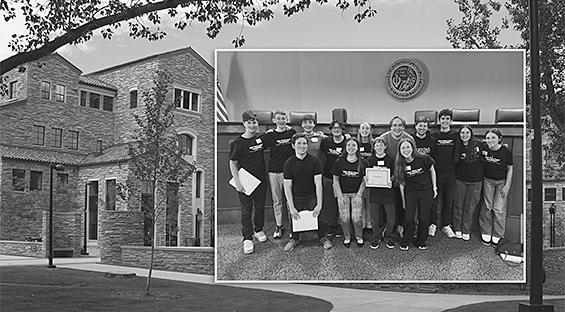
try on the kippah and taught him the significance of it.
“I think the response of trying to reach out and help people understand who we are as a people should always be the first response,” he said.
I admire Kobi’s grace. The whole team did. It deepened our determination to show that we are not just “some Jewish school” but a school rich in values and purpose. We practiced our arguments, discussed intricate legal questions as the day went on and eventually won half of the six championship spots — for the second year in a row.
The Friday before the competition, my team gathered around a fireplace in the hotel lobby to say Kiddush and Hamotzi.
Due to snowy conditions that night, our Shabbat dinner plans at Hillel got cancelled. The dinner that was prepared for us was delivered to the hotel.
As we all helped lead Kiddush, we got looks from many hotel guests, none of whom we knew. Some glanced over and turned away, others stared longer with a seemingly annoyed,
yet curious expression; needless to say, it felt odd.
I could only imagine what they might be thinking — perhaps we were interrupting their silent revelry or maybe they felt disgust, or were genuinely curious. Eventually I realized it didn’t matter what the hotel guests were thinking, especially as I was uttering the holy words of Kiddush. Instead, I was thinking about how lucky I was to be there, surrounded by my beloved friends, embracing my beloved religion. To be honest, this was one of the few times I openly expressed my Jewish identity in a non-Jewish space, with an audience present.
Despite the discomfort, I knew I couldn’t — and wouldn’t — let that dictate what I was feeling. In turn, we persisted, proud of our Judaism.
Just as in anything, there were glimpses of light. The hotel staff were kind to accommodate our religious practices and later into the night, hotel guests came and chatted with us as we practiced.
As we served ourselves from the trays of lukewarm schnitzel in the hotel lobby, I knew this was the moment: the moment I stopped being so self-conscious about my Judaism and started to become self-confident in it. I felt proud that we kept praying and proud of that seed that was planted many years before.
“It was one of those moments where you realize what you’re doing is so weird, but you love it so much,” said sophomore Julie Steiner, another competitor. “We were exactly where we were supposed to be.”
In Denver, I’m constantly surrounded by a Jewish community — my friends, my school, my family. But the competition brought me out of that bubble and into a reality different from my own.
Many times I question who I really am as a Jew and I’m not quite sure what that answer is yet, but what I do know is that I am a proud Jew. I am no longer afraid of judgement and no longer afraid to wear a kippah. As Jews, we have to stick together and we can’t be ashamed or afraid of what others think.
This trip gave me just that: the courage and faith to do the simple action of wearing my kippah out in public. Now, out in public, I make a concerted effort to wear my kippah out — for pride, for representation and for strength.
The views and opinions expressed in this article are those of the author and do not necessarily reflect the views of JTA or its parent company, 70 Faces Media.
ANDREW SILOW CARROLL
JTA
Israeli journalist Lee Yaron’s account of the Oct. 7 attacks in Israel and their aftermath was named the book of the year at the 74th National Jewish Book Awards, making her the youngest author ever to win the honor.
The Jewish Book Council, which sponsors the awards, said that 10/7: 100 Human Stories, provides “a vital window into the history of the Israeli-Palestinian conflict and how internal political turmoil in Israel has affected it, offering the narratives not of politicians or the military but of the lives of everyday people who lived tenuously on the border with Gaza.”
Yaron, 30, speaking to the Jewish Telegraphic Agency last September, said that her impulse to interview survivors, first responders and eyewitnesses to the attacks grew out of her own grief and sense of shock over the Hamas attacks, which killed some 1,200 people and took hundreds hostage.
“I had a mission, I knew what I needed to do, and I was focused on this,” said Yaron, who divides her time between New York and Israel. “The book helped me to deal with my grief and my sense of hopelessness.”
Yaron is among a number of Israeli authors, as well as books about Israel, due to be honored by the JBC at the Marlene Meyerson JCC Manhattan Wednesday evening as part of the JCC’s Books That Changed My Life Festival.
Amir Tibon won the award for autobiography and memoir for The Gates of Gaza: A Story of Betrayal, Survival, and Hope in Israel’s Borderlands, which centers on his rescue by his father and mother as Hamas terrorists invaded his neighborhood at Kibbutz Nahal Oz.
Ayelet Tsabari won the JJ Greenberg Memorial Award for Fiction, her first, for her novel Songs for the Brokenhearted, a family drama that draws on her Yemeni Jewish background. The Hebrew Fiction in Translation award went to Maya Arad for her book The Hebrew Teacher, translated by Jessica Cohen. The collection of novellas largely focuses on Israelis living in the United States.
In the visual arts category, several authors shared the award for 101 Treasures from the National Library of Israel; the Jerusalem-based library last year celebrated its move to a new state-of-the-art building.
“It’s especially meaningful that this year’s awards are going to a number of Israeli authors and books on Israel,” Elisa Spungen Bildner, the Jewish Book Council’s president, said in a
statement. “These works offer critical opportunities for engagement, debate, and dialogue for our community–one of the most fundamental roles of literature. We are proud to uplift and support these books and bring them to new readers across the world.”
The JBC also honored Rabbi Irving (Yitz) Greenberg, 91, with its Lifetime Achievement Award for his latest book, The Triumph of Life: A Narrative Theology of Judaism
Yael van der Wooden won the Goldberg Prize for Debut Fiction for her novel The Safekeep. The highly anticipated novel, by a writer who is originally from Tel Aviv and currently resides in the Netherlands, is a love story set in a 1960s Holland haunted by the legacy of World War II. Editor’s note: This article was edited for length. The complete text, as well as a comprehensive list of all winners, can be found at JTA.org, or at omahajewishpress.com
Continued from page 8
now famous phrase she used to describe the Nazis’ genocidal enterprise, “the banality of evil,” minimized Eichmann’s crimes. Worse, they said, she had shown remarkably little empathy for the Jews forced into collaborating with their tormentors.
Arendt’s reputation took another, posthumous, hit in 1982 when a biographer wrote about her youthful love affair and lasting friendship with the famed German philosopher and later Nazi Party member Martin Heidegger.
Her defenders, however, remained fiercely loyal to her work and her legacy. They included Jerome Kohn, who died in November at the age of 93. Much that was written and said about her was “preposterous,” wrote Kohn, her executor, former research assistant and the founder of the Hannah Arendt Center at The New School in Manhattan. He was particularly adamant about accusations that she was a “self-hating Jew.” In a collection he edited of Arendt’s Jewish writings, Kohn insisted that her experience as a Jew — as a target of antisemitism in her youth, as a German Jew left stateless, as a supporter of a Jewish nation in Palestine, (albeit a binational state of Jews and Arabs) — “is literally the foundation of her thought: it supports her thinking even when she is not thinking about Jews or Jewish questions.”
In his book about Arendt’s notion of “solidarity,” Kim, a professor in the department of European Languages and Transcultural Studies at the University of California, says Arendt’s perception of how the world failed the Jews shaped her thinking on liberation for other oppressed peoples — and not always for the better. While she considered herself what today we might call an “antiracist,” by the late 1960s she was
wary of the Black Power movement and rejected the idea of assigning collective guilt to white people for the evils of slavery, Jim Crow and lingering racism. Her resistance to the militant wing of the civil rights movement, writes Kim, “tells the story of Arendt’s imperfect love for the world.”
And yet in death Arendt seems to have gotten the last word: Beginning with the rise of Donald Trump and the resurgence of real and would-be autocrats from Venezuela to Hungary to Russia, her works are back in fashion. Even her poems — published together for the first time in the new collection — reflect preoccupations that seem of the moment: alienation, loneliness, the feeling of being a refugee, the terror of living under totalitarianism and a way of thinking free of ideological orthodoxies.
And yet Hill, the editor of the poetry collection, cautions against relying on Arendt as a sort of intellectual guru. At a conference in November, she even suggested “it’s time to put her back on the shelf.”
“We live in a radically different time today, and I think that requires a new form of analysis,” Hill, a professor at the Brooklyn Institute for Social Research, told me. “I think that to try to divine what is happening right now through her work is a sort of misdirection, and it can lead to a kind of looking away from reality, which is the very thing that she cautioned us against.”
Andrew Silow-Carroll is editor at large of the New York Jewish Week and managing editor for Ideas for the Jewish Telegraphic Agency.
The views and opinions expressed in this article are those of the author and do not necessarily reflect the views of JTA or its parent company, 70 Faces Media.
B’NAI ISRAEL SYNAGOGUE
618 Mynster Street Council Bluffs, IA 51503-0766
712.322.4705 www.cblhs.org
BETH EL SYNAGOGUE
Member of United Synagogues of Conservative Judaism 14506 California Street Omaha, NE 68154-1980
402.492.8550 bethel-omaha.org
BETH ISRAEL
SYNAGOGUE
Member of Union of Orthodox Jewish Congregations of America 12604 Pacific Street Omaha, NE. 68154
402.556.6288 BethIsrael@OrthodoxOmaha.org
CHABAD HOUSE
An Affiliate of Chabad-Lubavitch 1866 South 120 Street Omaha, NE 68144-1646
402.330.1800 OChabad.com email: chabad@aol.com
LINCOLN JEWISH COMMUNITY:
B’NAI JESHURUN
South Street Temple
Union for Reform Judaism 2061 South 20th Street Lincoln, NE 68502-2797
402.435.8004 www.southstreettemple.org
OFFUTT AIR
FORCE BASE
Capehart Chapel 2500 Capehart Road Offutt AFB, NE 68123
402.294.6244 email: oafbjsll@icloud.com
TEMPLE ISRAEL
Union for Reform Judaism (URJ) 13111 Sterling Ridge Drive Omaha, NE 68144-1206
402.556.6536 templeisraelomaha.com
LINCOLN JEWISH COMMUNITY:
TIFERETH ISRAEL
Member of United Synagogue of Conservative Judaism 3219 Sheridan Boulevard Lincoln, NE 68502-5236 402.423.8569 tiferethisraellincoln.org
Monthly Speaker Series Service, Friday, Feb. 14, 7:30 p.m. with our guest speaker, Thomas Fohner. Our service leader is Larry Blass. Everyone is always welcome at B’nai Israel!
For information about our historic synagogue, please visit our website at www.cblhs.org or contact any of our other board members: Renee Corcoran, Scott Friedman, Rick Katelman, Janie Kulakofsky, Howard Kutler, Carole and Wayne Lainof, Ann Moshman, MaryBeth Muskin, Debbie Salomon and Sissy Silber. Handicap Accessible.
Services conducted by Rabbi Steven Abraham and Hazzan Michael Krausman.
IN-PERSON AND ZOOM MINYAN SCHEDULE:
Mornings on Sundays, 9:30 a.m.; Mondays and Thursdays, 7 a.m.; Evenings on Sunday-Thursday, 5:30 p.m.
FRIDAY: PreNeg and Tot Shabbat, 5:30 p.m.; Kabbalat Shabbat, 6 p.m. at Beth El & Live Stream.
SATURDAY: Shabbat Morning Services, 10 a.m. at Beth El and Live Stream; Jr. Congregation (Grades K12), 10 a.m.; Havdalah, 6:15 p.m. Beth El and Zoom.
SUNDAY: BESTT (Grades K-7), 9:30 a.m.; HandsOn Judaism, 11:15 a.m. with Hazzan Krausman.
TUESDAY: Mishneh Torah, 10:30 a.m. with Rabbi Abraham
WEDNESDAY: BESTT (Grades 3-7), 4 p.m.; Hebrew High (Grades 8-12), 6 p.m.; Bid for BESTT Art Auction, 6 p.m.
FRIDAY-Feb. 7: PreNeg and Tot Shabbat, 5:30 p.m.; Kabbalat Shabbat, 6 p.m. at Beth El & Live Stream.
SATURDAY-Feb. 8: Shabbat Shira Morning Services, 10 a.m. at Beth El and Live Stream; Jr. Congregation (Grades K-12) 10 a.m.; Havdalah, 6:25 p.m. Beth El and Zoom. Please visit bethel-omaha.org for additional information and service links.
FRIDAY: Nach Yomi, 6:45 a.m.; Shacharit, 7 a.m.; Mincha/Kabbalat Shabbat/Candlelighting, 5:22 p.m.
SATURDAY: Shabbat Kollel, 8:30 a.m.; Shacharit, 9 a.m.; Tot Shabbat 10:30 a.m.; Youth Class 10:45 a.m.; Soulful Torah, 4:25 p.m. with Rabbi Geiger; Mincha, 5:10 p.m.; Kids Activity/Laws of Shabbos, 5:40 p.m.; Havdalah, 6:24 p.m.
SUNDAY: Shacharit, 9 a.m.; Duties of the Heart, 3 p.m.; Mincha/Ma’ariv 5:30 p.m.
MONDAY: Nach Yomi 6:45 a.m.; Shacharit 7 a.m.; Monday Mind Builders, 4 p.m.; Mincha/Ma’ariv, 5:30 p.m.
TUESDAY: Nach Yomi, 6:45 a.m.; Shacharit, 7 a.m.; Mincha/Ma’ariv, 5:30 p.m.
WEDNESDAY: Nach Yomi, 6:45 a.m.; Shacharit, 7 a.m.; Mincha/Ma’ariv, 5:30 p.m.
THURSDAY: Nach Yomi, 6:45 a.m.; Shacharit, 7 a.m.; Character Development, 9:30 a.m.; Mincha/ Ma’ariv, 5:30 p.m.
FRIDAY-Feb. 7: Nach Yomi, 6:45 a.m.; Shacharit, 7 a.m.; Mincha/Kabbalat Shabbat/Candlelighting, 5:30 p.m.
SATURDAY-Feb. 8: Shabbat Kollel, 8:30 a.m.; Shacharit, 9 a.m.; Tot Shabbat, 10:30 a.m.; Youth
Class 10:45 a.m.; Soulful Torah, 4:35 p.m. with Rabbi Geiger; Mincha, 5:20 p.m.; Kids Activity/Laws of Shabbos, 5:50 p.m.; Havdalah, 6:33 p.m. Please visit orthodoxomaha.org for additional information and Zoom service links.
All services are in-person. All classes are being offered in-person and via Zoom (ochabad.com/academy). For more information or to request help, please visit www.ochabad.com or call the office at 402.330.1800.
FRIDAY: Shacharit 8 a.m.; Lechayim, 4:30 p.m. go to ochabad.com/Lechayim to join; Candlelighting, 5:21 p.m.
SATURDAY: Shacharit 10 a.m. followed by Kiddush and Cholent; Shabbat Ends, 6:24 p.m.
SUNDAY: Sunday Morning Wraps, 9 a.m.
MONDAY: Shacharit 8 a.m.; Personal Parsha 9:30 a.m. with Shani Katzman; Intermediate Biblical Hebrew Grammar, 10:30 a.m. with Prof. David Cohen; Parsha Reading, 6 p.m. with Prof. David Cohen; Translating Words of Prayer, 7 p.m. with Prof. David Cohen.
TUESDAY: Shacharit 8 a.m.; Translating Words of Prayer, 11 a.m. with David Cohen; Intermediate Biblical Hebrew Grammar, 6 p.m. with Prof. David Cohen; Introductory Biblical Hebrew Grammar, 7 p.m. with Prof. David Cohen.
WEDNESDAY: Shacharit 8 a.m.; Mystical Thinking (Tanya) 9:30 a.m. with Rabbi Katzman; Introductory Biblical Hebrew Grammar, 10:30 a.m. with Prof. David Cohen; Parsha Reading, 11:30 a.m. with Prof. David Cohen.
THURSDAY: Shacharit, 8 a.m.; Introduction to Alphabet, Vowels & Reading Hebrew, 10 a.m.; Advanced Biblical Hebrew Grammar, 11 a.m. with Prof. David Cohen; Talmud Study, noon-1 p.m. with Rabbi Katzman; Introduction to Alphabet, Vowels & Reading Hebrew, 6 p.m.; Code of Jewish Law Class, 7 p.m.
FRIDAY-Feb. 7: Shacharit 8 a.m.; Lechayim, 4:30 p.m. go to ochabad.com/Lechayim to join; Candlelighting, 5:30 p.m.
SATURDAY-Feb. 8: Shacharit 10 a.m. followed by Kiddush and Cholent; Shabbat Ends, 6:32 p.m.
LINCOLN JEWISH COMMUNITY: B’NAI JESHURUN & TIFERETH ISRAEL
Services facilitated by Rabbi Alex Felch. All services offered in-person with live-stream or teleconferencing options.
FRIDAY: Shabbat Candlelighting, 5:25 p.m.; Fifth Friday Festivities: Community Shabbat Dinner, 6 p.m. and Shabbat Services, 7 p.m. led by Rabbi Alex at SST.
SATURDAY: Shabbat Service, 9:30-11 a.m. led by Rabbi Alex at TI; Torah Study, noon on Parshat Bo led by TBD via Zoom; Havdalah, 6:28 p.m.
SUNDAY: LJCS Classes, 9:30-11:30 a.m. at TI; Men’s Bike/Coffee Group, 10:30 a.m. at The Mill on the Innovation Campus. For more information or questions please email Al Weiss at albertw801@gmail.com; Adult Ed: Intro to Judaism Class, noon at TI. Please contact Rabbi Alex to register or to ask any questions you may have.
TUESDAY: Deadly Deception at Sobibor Screening 7-9 p.m. at Nebraska Union, 1400 R St, Lincoln.
ANNETTE VAN DE KAMP WRIGHT
Jewish Press editor
“Jewish Community Must Be Built This Year” the headline screamed in the March 12, 1925, edition of the Jewish Press. The font was large and bold; the slogan spread across the front page, not only above the fold, but above the masthead. The story included headshots of the newly elected officers of the JCC, as well as a rendition of what the building would look like.
The names are still familiar, if one knows anything about Jewish Omaha’s history: Harry H. Lapidus, Henry Monsky, Joe L. Wolf and Louis Kirschbraun.
“This is the slogan adopted by more than 1,000 subscribers who attended the annual meeting of the Jewish Community Center Wednesday evening in the Brandeis Grill,” the article started.
Following are a few other paragraphs from that article.
“With this slogan in mind, more than two hun-
dred workers volunteered to help collect the pledges for the Jewish Community Center Building.Those workers under the leadership of chairmans will canvas every home in the city for the subscribers who have not yet paid their pledges.
“We need the entire support of every man, woman and child in the city to put this building over the top,” said Harry H. Lapidus, newly elected president and general chairman of this drive. “It is the duty of every Jew in our community to help build this building this year.”
The workers will meet every noon at the Loyal Hotel for this occasion.
“I will not be a party to any undertaking that will result in a failure for the community,” said Harry Lapidus, when nomitaed for the office of presidency. “I must have the entire support of the community; it is not a one man’s job, but the job of every Jewish person in the city.”
Lapidus was unanimously elected president by the large audience who stood and cheered for sev-
WEDNESDAY: Men’s Lunch Group, 12:15 p.m. at HoriSun, 8055 O St. We meet every other Wednesday. Contact albertw801@gmail.com to join and receive updates. Bring your own lunch and beverage; LJCS Hebrew School, 4:30-6 p.m. at TI; Jewish Themes Through Jewish Films Movie Night: The Last Suit, 6:30-8:30 p.m. at SST.
FRIDAY-Feb. 7: Shabbat Candlelighting, 5:34 p.m.; Kabbalat Shabbat Service, 6:30-7:30 p.m. led by Rabbi Alex at SST.
SATURDAY-Feb. 8: Shabbat Service, 9:30-11 a.m. led by Rabbi Alex at TI; Torah Study, noon on Parshat Beshalach led by TBD via Zoom; Havdalah, 6:44 p.m.
FRIDAYS: Virtual Shabbat Service, 7:30 p.m. every first and third of the month at Capehart Chapel. Contact TSgt Jason Rife at OAFBJSLL@icloud.com for more information.
In-person and virtual services conducted by Rabbi Benjamin Sharff, Rabbi Deana Sussman Berezin, and Cantor Joanna Alexander.
FRIDAY: Drop-In Mah Jongg, 9 a.m. In-Person; Shabbat B’yachad Service, 6 p.m. In-Person & Zoom.
SATURDAY: Torah Study, 9:15 a.m. In-Person; Shabbat Morning Service, 10:30 a.m. In-Person & Zoom..
SUNDAY: Grades PreK-7, 9:30 a.m. In-Person; Prayer Preparation: Chanting and Reading Prayers, 1 p.m. In-Person.
TUESDAY: Gender Dynamics of the Israel-Hamas War, 7 p.m. In-Person
WEDNESDAY: Yarn It, 9 a.m. In-Person; Grades 36, 4:30 p.m. In-Person; Hebrew High: Grades 8-12, 6 p.m. In-Person; How the Israelites Became The Jews, 6:30 p.m. In-Person.
THURSDAY: The Zohar: Thursday Morning Class 11 a.m. with Rabbi Sharff and Rabbi Azriel — In-Person & Zoom; Israel-Palestine Class Part II, 6:30 p.m. InPerson.
FRIDAY-Feb. 7: Drop-In Mah Jongg, 9 a.m. In-Person; Special Shabbat Celebrating Our Third Grade Class and the 50th Anniversary of Women in the Cantorate, 6 p.m. In-Person & Zoom.
SATURDAY-Feb. 8: Torah Study, 9:15 a.m. In-Person; Shabbat Morning Service, 10:30 a.m. In-Person & Zoom. Please visit templeisraelomaha.com for additional information and Zoom service links.
As of January 1, 2025, the Jewish Press will charge $180 for the inclusion of standard obituaries, up to 400 words. Photos may be included if the family so wishes. For many years, we have held off on making this decision. However, it is no longer financially responsible for us to include obituaries at no charge. For questions, please email avandekamp@ jewishomaha.org. Obituaries in the Jewish Press are included in our print edition as well as our website at www.omahajewishpress.com
eral minutes with the result of the election. It will be remembered that Lapidus was general chairman of the original campaign at which time more than $250,000 was raised, including the gift of the late Morris Levy.
Henry Monsky gave a detailed report of the activities of the Jewish Community Center, and when it was originally started at Twenty-first and Burt streets, and because of financial reasons, the building could not go on.
“I remember the time when a group of men met in 1911 to discuss plans for a building in Omaha,” said Henry Monsky. “This little loyal group of men made pledges to raise $50,000 for a building and the pledges were later raised, but because of the fateful tornado of 1913, the plans were dropped. They were later revived with new energy, but again we were forced to drop them because of the world war. But it is only recent history, and everyone in this room knows of the beginning of this campaign, which is now a realization.”
Marilyn Ruth Lee (Freed) Berman passed away on Jan. 24, 2025. Services were held on Jan. 26, 2025, at Mt. Sinai Cemetery.
She was preceded in death by her parents and her husband; by siblings, Etta and Jonathan; and by in-laws, Sam and Mollye Berman, Max Freed, and Trudi and Isadore Epstein.
She is survived by her sons, Harry and daughter-in-law Beth Cohen, Steven, and Phillip; grandchildren: Samantha Berman and Ethan Kunz, Zoe and Yigal Goldstein, Max Berman, and Bradley Berman; great-grandchild: Avraham Gavriel Goldstein; brother, Goodman Freed; sister-in-law, Irene Maxwell; beloved nieces and nephews, and many dear friends.
Marilyn was born in Philadelphia, PA, on Nov. 28, 1936, to U.S. Magistrate Judge M. Phillip and Myna Freed. She was the youngest of four children, including sister Henrietta (Etta) and brothers Goodman (Goody) and Jonathan. She graduated from Olney High School and went on to earn a Bachelor in Education at Lesley College in Massachusetts. Her early career included being an elementary school teacher and working for New Math as a curriculum writer. She married Dr. Bradley Berman in 1963, and moved to Omaha, NE, in 1967 when Bradley was hired as a neurosurgeon at the University of Nebraska Medical Center. Mar-
ilyn and Brad had three sons, Harry, Alec Steven, and Phillip. After the three boys had started school, Marilyn became involved as a volunteer with the UNMC Thrift Store and Opera Angels. She was a founding member of the Kripke Jewish Federation Library Book Club, she participated in NCJW Trouping Theater, and was a longtime member of Omaha Toastmasters Club 281. After the boys grew up, Marilyn worked at First Data for over 25 years. Memorial may be made to Friedel Jewish Academy or Beth Israel Synagogue.
JAMES WAX
James Wax passed away on Jan. 23, 2025, at age 91. Services were held on Jan. 27, 2025, at Beth El Cemetery, 84th & L Streets.
He was preceded in death by his beloved wife, Esther; and daughter, Marcy Wax Irwin.
He is survived by his son, Chaim (Rivka); daughters: Karen Cain (Donald) and Julie Stein (David); 15 grandchildren; 10 greatgrandchildren; brother-in-law, Ted Pittelman; and many other relatives and friends.
Memorials may be made to Beth El Synagogue’s Seth Rich Memorial Camp Scholarship Fund or the Rose Blumkin Jewish Home.
Hamas released four hostages on Saturday Jan. 25 in a choreographed ceremony in Gaza, making them the second group of captives to go free in the ceasefire that began earlier this week.
The four hostages released are Daniela Gilboa, Liri Albag, Naama Levy and Karina Ariev. All are Israeli soldiers. Before being allowed to return to Israel after nearly 16 months in captivity, they were paraded across a stage in Gaza wearing green fatigues, against a banner with English, Arabic and Hebrew slogans such as “Zionism will not win” and “Palestine — the victory of the oppressed people vs the Nazi Zionism.” They also received gift bags.
The four captives smiled and waved as they walked across the stage in front of a crowd, which, according to Israeli media, was meant to be a show of strength in the face of their captors. The event contrasted with the release of three Israeli women hostages on Sunday, Jan. 19, which came with images of the captives leaving Gaza amid a crowd of Hamas gunmen.
The release came amid tensions over the first phase of the ceasefire deal, which is due to last six weeks. Israel had expected the release of Arbel Yehud, a civilian, but she is being held by Islamic Jihad, another Gaza terror group, and did not go free. She is reportedly due to be released this week, along with American Keith Siegel and Agam Berger, another female Israeli soldier.
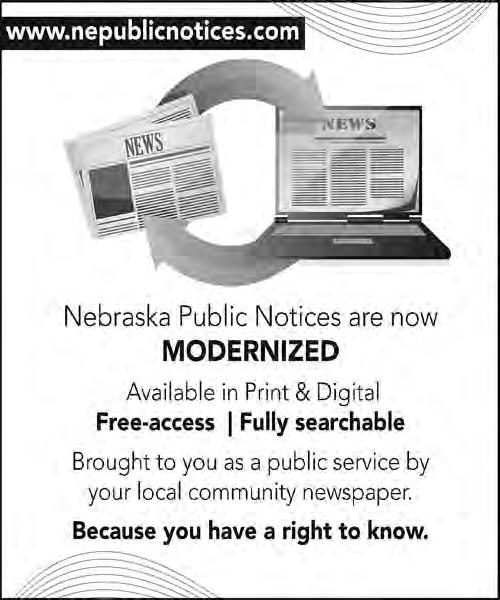
The other civilian woman still in captivity is Shiri Bibas, who was abducted with her children Kfir and Ariel. Hamas said early in the war that all three of those members of the Bibas family had been killed, but Israel has not confirmed that allegation. Yarden Bibas, Shiri’s husband and the father of the two boys, is also still in captivity.
In response to Arbel not being released, Israel delayed the return of Palestinians to north Gaza, which was due to begin on Saturday. Israel also released 200 Palestinian security prisoners in exchange for the four hostages, many of whom were serving life sentences for murdering Israelis and other acts of terror.
A total of 90 hostages are still being held in Gaza, dozens of whom have been confirmed to be dead. Hamas was due to provide details as to the condition of some of them, though the extent of that information remains unclear.
The release came six days after Hamas released Emily Damari, Romi Gonen and Doron Steinbrecher, all civilian women. In exchange, Israel released some 90 Palestinian security prisoners.
The release of the hostages has occasioned celebration and relief across Israel. Most Israelis are in favor of the ceasefire deal, but it has also drawn opposition because it includes the release of convicted Palestinian terrorists and potentially an end to Israel’s military campaign against Hamas in Gaza. President Donald Trump has pushed for the deal, but also sounded skeptical about it lasting.




ADVERTISE STATEWIDE for $225/25 word classified ad. Over 140 newspapers with circulation of more than 237,000. Contact the Jewish Press or call 1-800-369-2850.
HELLO NEBRASKA! Introducing www.nepublicnotices.com, a new public notice website presented as a public service by all Nebraska newspapers. Free access, fully searchable – because democracy depends upon open government and your right to know.
BANKRUPTCY RELIEF! Help stop Creditor Harassment, Collection Calls, Repossession and Legal Actions! Speak to a Professional Attorney and Get the Help You NEED! Call NOW 844-215-3629.
AFFORDABLE PRESS Release service. Send your message to 155 newspapers across Nebraska for one low price! Call 1-800369-2850 or www.nebpress.com for more details.
SWITCH AND save up to $250/year on your talk, text and data. No contract and no hidden fees. Unlimited talk and text with flexible data plans. Premium nationwide coverage. 100% U.S. based customer service. For more information, call 1-877-768-5892.
DENTAL INSURANCE from Physicians Mutual Insurance Company. Coverage for 350 plus procedures. Real dental insuranceNOT just a discount plan. Do not wait! Call now! Get your FREE Dental Information Kit with all the details! 1-855-490-4149 www.dental50plus.com/81 #6258
FOR SALE - SATELLITE
GET DISH Satellite TV + Internet! Free Install, Free HD-DVR Upgrade, 80,000 On-Demand Movies, Plus Limited Time Up To $600 In Gift Cards. Call Today! 1-877-688-4784
HOME SERVICES
SAFE STEP. North America s #1 Walk-In Tub. Comprehensive lifetime warranty. Top-of-the-line installation and service. Now featuring our FREE shower package and $1600 Off for a limited time! Call today! Financing available. Call Safe Step 1-877-9330188.
DOES YOUR basement or crawl space need some attention? Call Thrasher Foundation Repair! A permanent solution for waterproofing, failing foundations, sinking concrete and nasty crawl spaces. FREE Inspection & Same Day Estimate. $250 off ANY project with code GET250. Call 1-844-958-3431.
WANTED TO BUY
WE BUY 8,000 cars a week. Sell your old, busted or junk car with no hoops, haggles or headaches. Sell your car to Peddle. Easy three step process. Instant offer. Free pickup. Fast payment. Call 1-855-910-0760.
WE BUY Houses for Cash AS IS! No repairs. No fuss. Any condition. Easy three step process: Call, get cash offer and get paid. Get your fair cash offer today by calling Liz Buys Houses: 1-855714-0010.
LYNN BATTEN
JFO Publicity Manager
2025 is set to be a special year for the Staenberg Omaha JCC as they recognize their 100th anniversary. One of the ways the organization plans to celebrate with the community is through a series of free and low cost pop up classes. The idea for these classes came from an item found in the Nebraska Jewish Historical Society archives - a JCC Adult Programming card, believed to be from the late 1920s or 1930s.
“We thought it would be fun to bring back these classes with a modern day spin,” said Mark Martin, Executive Director of the Staenberg Omaha JCC. “It underscores that, while much has changed over the last 100 years, our mission is very much the same. We still strive to provide the community with social, cultural, recreational and educational opportunities - all within one of the best facilities in Omaha.”
Dance class on Feb. 13. It is only $10 a person and would be a really fun date night. It will be led by a professional instructor. Class is at 7 p.m. We plan to have a cash bar available before the event for those 21+ who would like to purchase an adult beverage.”
Other events scheduled for February include another ‘Film &

100th anniversary classes will be offered throughout the year as one-time, “pop up” events. Most will be open to both JCC Members and Non-Members. Participant age will be dependent upon the program. All classes will be held at the Staenberg Omaha JCC and will be offered for free or at a reduced cost. Those planning to attend must register using the links provided on the 100th Anniversary page of the JCC’s website. https://www.jccomaha.org/100th-anniversary-events/ Classes began on Jan 16 with a new take on the “Women’s Gym Class”. The modern version was presented as a boot camp-style group exercise class open to JCC Members. Then, on Jan. 17, in partnership with Jewish Family Service, the JCC hosted a “Film & Friends” movie day geared towards ages 55+.
“Looking ahead, we have a lot of great classes scheduled for February,” Martin said. “We are bringing back the Latin
Friends” movie day on Feb. 7 at 1 p.m., a Classical Musical Appreciation class on Feb. 11 at 6:30 p.m., a “Stop the Bleed” First Aid Training on Feb. 18 at 6 p.m., and a Community Blood Drive from 9 a.m. 3 p.m. on Thursday, Feb. 20. All February events are free and open to the community. Those planning to attend must register via the JCC’s website. Registration for the blood drive can be completed via the American Red Cross website. 100th Anniversary Classes will be offered throughout the year. Events through March are currently posted on the JCCs website. New events and classes will be posted regularly.
“We encourage everyone to celebrate this special milestone with us.” Martin said. “The Jewish Community Center has been a big part of Omaha since 1925. One hundred years later we’re still here. We are grateful for our wonderful community and hope they enjoy these events. We welcome everyone to come experience our state of-the-art facilities, outstanding programs and dedicated staff.”
